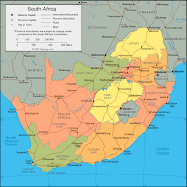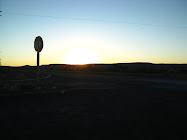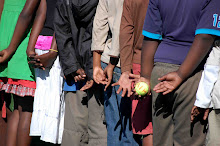In an effort to recruit over 200 kids for our upcoming soccer/HIV and AIDS education event, my fellow intern Hooter and I took to the streets of Galeshewe, visiting 10 different schools, three days in a row, to drop off and retrieve necessary forms. We spoke with teachers and school principals who were both eager and thankful to get their students involved, and we waved and smiled incessantly at rowdy, uniformed kids. On the last day before the holiday break, we stopped by all of the schools to drop off “Yellow Cards”—our hopeful attempt to make the participants actually show up the following Monday.
At our last school, as I frantically rushed to color in the final cards, my yellow colored pencil was dwindling. I awkwardly attempted to whittle the tip of the pencil with a scissor blade. My fumbling hands, outstretched from our car window, must have been comically visible, because without even noticing her presence, I was gently nudged by a young girl. She didn’t say a word, but she opened her palm flat, revealing a tiny metal pencil sharpener. I thanked her profusely, and at an unfortunately high octave due to this unexpected thoughtfulness. I sharpened my pencil as quickly as I could, returned the device to her little hand, and watched as she scampered off away from our car.
I was blown away. It seems so ridiculous, but it totally struck me. I was giddy for the rest of the afternoon. She was probably surprised when I assaulted her with my excessive gratitude, but it just flowed out of me. I can only hope to make a similar impact with such a simple gesture someday.
Interestingly, yet unsurprisingly, even the world of sports is largely segregated in South Africa, especially in Kimberley. White Afrikaners doggedly support their favorite rugby teams, while soccer is life for most black South Africans. At “The Halfway House,” the local bar we’ve begun to frequent, two large “Natal Sharks” statues preside over the courtyard. On a random weekend night at the Half, I once asked an Afrikaner man if he was going to attend a big upcoming soccer match. He laughed in my face. Galeshewe, on the other hand, is dotted with red dirt soccer fields. Painted emblems of favorite South African soccer teams brand most houses. When we saw a Bloemfontein Celtics game, we were quite possibly the only white people in a packed stadium seating over 20,000. (An experience that deserves its own post…if only motivation wasn’t’ so hard to come by.)
In an extremely, seriously extremely, rare turn of events, the South African national soccer team, Bafana Bafana, rolled into Kimberley, of all places, to play an international friendly match against the Malagasy national team. Somewhat ironically, they displaced the local professional rugby team, and the once predominantly white populated stadium assumed an entirely new character, as hundreds of black Bafana fans filed into the stands. The stadium erupted when Bafana finally scored the only goal of the match late in the second half.
As we meandered our way out of the stands to beat the post-game rush, we exchanged Bafana cheers with the crazy, yellow-clad fans in front of us. One man looked at our little string of white soccer fanatics and said “Thank you. I’ll be at the next rugby match.” It happened so quickly I almost missed what he was actually saying to us. I returned his smile and waved as the flow of the exiting crowd pushed us steadily forward.
Bafana Fans
Language seems to be somewhat of a dividing force here in Kimberley. While I’ve encountered many black children and adults who speak both English and Afrikaans, in addition to their native Setswana, I have yet to meet an Afrikaner who utters a word of Setswana. Necessity breeds change, and apparently Afrikaans works. I guess language will probably remain a one-way (drive-in-the-left-lane) type of street, for now.
This communication dynamic has largely motivated me to pick up a little Setswana here and there, primarily through daily harassment of Thuso. After countless humbling yet hilarious attempts to mimic the more guttural sounds Thuso so effortlessly voices, I’ve perfected a few key phrases.
Today, as I perused the produce aisle in our local Pick n Pay, I smiled at an older black employee as he stocked avocados. He had a wrinkled, friendly face, and his dark hair faded into an endearing gray border meeting his forehead. I timidly uttered “Dumela rra”—Hello sir—and his smile lit up. He responded, “Le kae?”—How am I. I said I was fine, and asked about him, all in Setswana. He grabbed onto my arm and practically hugged me right then and there. Right next to the avocados. He laughed affectionately as I explained that, unfortunately, I had already exhausted my Setswana vocabulary. I assured him that I’d work on it and return to speak to him. I could tell just by looking at him that he believed me, and he believed in me. Well, I couldn’t really tell that he believed in me just by looking at him. He actually told me that.
Either way, I’m looking forward to our next conversation, after I pick Thuso’s brain a little more. I’m hoping I’ll get another hug.
















Yo Lindsay,
ReplyDeleteThe blog looks great and its awesome to see what you are all up to. I was just trying to catch up with everyone's blog while I wait for salesforce to do stuff. Hope all is well in Kim and we can't wait to see you at halloween. I was also wondering where you go the picture of cape town for your blog page because it is almost identical to the one I have on my page.... check it out (domgrs.blogspot.com)! Stay good and see you soon!
Dom